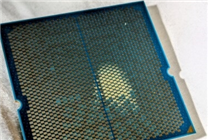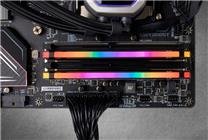AMD 9950X CPUs Overheating Issues: An Investigation
Recent reports have surfaced regarding the potential overheating and failure of AMD’s 9950X CPUs during intensive testing. Torbjörn Granlund, the author of the GMP open-source library, revealed that he experienced failures with two of these CPUs over the past few months. The first incident occurred in February, followed by another failure in August.
Testing Conditions and Observations
Granlund noted that his testing conditions could have been better, yet both CPUs clearly exhibited signs of being overloaded when subjected to rigorous GMP tests. He observed a 25 square millimeter discoloration on one side of the CPU pins, indicating severe overheating. It is worth mentioning that all tested CPUs operated under maximum workload at the time of failure.
Interestingly, Granlund reported that the ambient temperature during testing was a stable 20 degrees Celsius. This factor raises questions about whether environmental conditions significantly contributed to the CPUs’ failure. He speculated that the MULX instruction, used during loop operations, might have led to undue stress on the processors.
Gradual Degradation Rather Than Sudden Failure
Unlike the sudden failure typically associated with overheating incidents, Granlund’s experience has shown a gradual degradation over months of excessive load. This contrasts sharply with another processor, the 7750X, which has functioned reliably under similar workloads.
AMD has acknowledged the situation, confirming that they are investigating the reports and have reached out to Granlund for further information. Their inquiry is essential to understanding the root cause of these failures and ensuring the quality of their CPUs.
Implications for Users
Despite the alarming reports, it is crucial to contextualize the findings. The GMP library is known for its compute-intensive demands, which means that most standard users may not encounter these overheating issues during typical usage. High-performance environments may stress CPUs beyond their intended limits, but casual users generally operate under much lighter conditions.
Moreover, AMD has consistently aimed to provide stable and reliable processors, and incidents like these are taken seriously. The company’s proactive approach indicates a commitment to addressing any potential flaws that could impact user experience.
Conclusion
The investigation surrounding the AMD 9950X CPUs highlights the delicate balance between performance and reliability in high-demand computing scenarios. While Granlund’s findings are concerning, they mostly pertain to extreme testing conditions that may not reflect everyday use. AMD’s ongoing inquiry will likely shed light on the matter, reinforcing their dedication to quality and performance in their products.
As users navigate the landscape of high-performance computing, it’s vital to remain aware of the limitations and operational conditions of the technologies they utilize. Standard users can generally feel confident in the reliability of AMD’s products, while those pushing their systems to the limit should remain vigilant and informed about potential risks.
Stay tuned for updates as AMD continues its investigation into the 9950X CPU performance concerns. This situation serves as a reminder of the complexities involved in maintaining optimal conditions for high-performance hardware.







